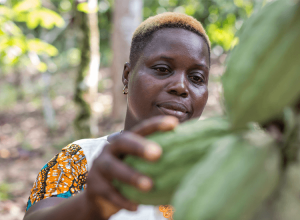The impact of Fairtrade on living standards in cocoa growing areas of Cote d’Ivoire
Photo: Ivorian cocoa farmer Rosine Bekoin inspects her crop
Last summer’s campaign asking Nestle to Keep KitKat Fairtrade gave us an opportunity to connect directly with some of the cocoa farming communities in Cote d’Ivoire who will be affected by the decision to buy cocoa on Rainforest Alliance rather than Fairtrade terms.
In our conversations the RICE network were very clear that Fairtrade really is the best, most impactful system, based on their conversations with the farmers and workers, but it’s always nice to have evidence for these claims. So we were pleased to see this study from academics from the Universities of Goettingen and Bonn, The abstract is reproduced here, and if you click the link at the bottom you can read the full study and conclusions.
Fairtrade certification has recently gained in importance for various export crops produced in developing countries. One of Fairtrade’s main objectives is to improve the social conditions of smallholder farmers. Previous research showed that Fairtrade has positive effects on farmers’ sales prices and incomes in many situations.
However, more detailed analysis of the effects on food security and other dimensions of household living standard is rare. Here, we use data from a survey of cocoa farmers in Cote ˆ d’Ivoire to analyze how Fairtrade certification affects aggregate household consumption expenditures and the consumption of specific types of consumer goods and services. We also differentiate between poor and non-poor households. Regression models with instrumental variables suggest that Fairtrade increases aggregate consumption expenditures by 9% on average. For poor households, the effect is even larger (14%). These effects are driven by increases in non-food expenditures. We do not find significant effects on food consumption and dietary diversity. In poor households, Fairtrade primarily increases spending on other basic needs such as housing and clothing, whereas in non-poor households positive effects on education and transportation expenditures are found. We conclude that Fairtrade improves farm household living standards, but not food security.

